Sarah L. Johnson's Blog, page 130
May 3, 2012
Book review: Slant of Light, by Steve Wiegenstein
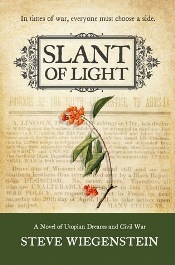 So much about Steve Wiegenstein's excellent debut novel calls to mind its mid-19th century setting: the deftly incorporated historical backdrop, the sensibilities of its characters, the rich authentic language, and even the book design, in which fonts, color, and images work together to enhance the overall package.
So much about Steve Wiegenstein's excellent debut novel calls to mind its mid-19th century setting: the deftly incorporated historical backdrop, the sensibilities of its characters, the rich authentic language, and even the book design, in which fonts, color, and images work together to enhance the overall package.The multifaceted plot centers on three individuals participating in a creative social experiment in the years before the Civil War. James Turner is a charismatic thinker and lecturer from the Illinois prairie who gained fame in writing Travels to Daybreak, a Utopian South-Seas adventure about communal living and the philosophy of democratic ideals.
Turner gets the chance to live out his literary creation when an admirer offers him some of his property — fertile bottomlands in remote southern Missouri — to establish his own Daybreak-style community. He can't resist accepting in gratitude, although he has concerns. "I never meant for people to take my ideas so seriously," he thinks to himself. His new bride, Charlotte, a young woman of intelligent common sense, rushes to join him there immediately. Accompanying her is Adam Cabot, a contemplative abolitionist who needs a place to lie low; his beliefs had almost got him lynched back in Kansas.
While Turner has no trouble attracting followers, problems soon arise, and Slant of Light takes readers step by step through the process as idealism meets up with hard reality. Daybreak's diverse residents aren't used to the backbreaking toil involved in planting crops and building homes, and they struggle over leadership issues (why should their Temple of Community get glass windows when their own cabins make do with oiled paper?). With Turner's attentions preoccupied, Charlotte finds a kindred spirit in Adam, whose personality meshes closely with hers. The original landowner's moonshiner son isn't excited about losing half his inheritance to a group of outsiders, either.
The breathtaking glory of nature they find at Daybreak is beautifully described and has a lovely calming effect. Still, even here on the edge of civilized America, the wider world predictably comes calling, which adds to the tension level. Plunking a peaceful haven down in a politically volatile slave state in 1857 may not have been the shrewdest move. Bushwhackers threaten violence if the colonists even hint at abolitionist tendencies. With civil war on the near horizon, people begin making individual decisions that threaten their neutrality and their togetherness.
Wiegenstein has a nice touch with dialogue, evoking the Turners' educated speech and the twangy drawl of the Ozark hillmen with equal skill. A thoroughly American story with more than regional appeal, Slant of Light is intellectually involving from the outset, and its flawed characters have a way of latching onto readers' emotions. Fans of quality historicals should enjoy seeing how the forces of history and human nature play out in this small corner of the nation.
~
Slant of Light was published by St. Louis-based Blank Slate Press in April at $14.95 (trade pb, 303pp). It's a local bestseller, and a real find - this is one of those small press gems that deserves wider attention. If a sequel's ever published, I'll be there. Find it on Goodreads.
Published on May 03, 2012 07:00
April 28, 2012
A look at Lynne Bryant's Alligator Lake
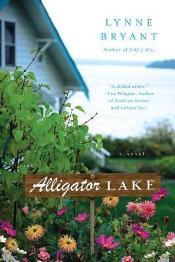 Historical novel readers might be tempted to pass by Lynne Bryant's Alligator Lake because it appears to be contemporary Southern fiction... which it very much is. But buried not so deeply beneath the modern story is a gripping multigenerational saga that travels back through sixty years of racial tension and violence in a rural Mississippi Delta town.
Historical novel readers might be tempted to pass by Lynne Bryant's Alligator Lake because it appears to be contemporary Southern fiction... which it very much is. But buried not so deeply beneath the modern story is a gripping multigenerational saga that travels back through sixty years of racial tension and violence in a rural Mississippi Delta town.Bryant doesn't offer pat endings or easy answers... that wouldn't be realistic given the prejudice that's been deeply ingrained in her setting for so long. At the end - I don't think I'm giving much away here - Avery Pritchett is still debating what's best for her family's future. Her nine-year-old mixed-race daughter, Celi, still has sickle-cell disease and will suffer its painful effects the rest of her life. And Avery's society-minded mother, Marion, is just beginning to unlearn her bigoted tendencies and accept that African-Americans have a place within her family - an even closer place than she originally knew. But some progress has been made, which gives hope for the future.
The story opens in 2000. Avery, a woman in her late twenties, works as a nurse in Colorado and has done her best to raise Celi on her own. Ten years earlier, as a pregnant teenager, she had fled Greendale, Mississippi, knowing that her relationship with Aaron Monroe would never be tolerated because of his race. It had already nearly cost him his life.
When her brother announces his engagement and invites her and Celi to be part of his wedding, Avery decides to make the trip home, realizing Celi deserves to know her father but fully aware of the difficult situations they will be facing.
Avery has another reason to return, too: to discover her genetic history. Since sickle-cell disease must be inherited from both parents, and it mostly affects African-Americans, Avery knows she herself must have black ancestry.
Each of Bryant's narrators has a clear, distinct voice and speaks her thoughts plainly. In the 1940s, Avery's grandmother Willadean becomes good friends with Sally and Henry Johnson, siblings in a black family, and endures name-calling and worse because of it. Marion, Willadean's daughter, grows up during the 1960s Civil Rights movement, horribly embarrassed by her mother's support of the Freedom Riders and desperate to fit in. A generation later, in 1991, Avery pursues a relationship with Aaron, Sally's handsome grandson, behind her family's back.
Times may change, but for the residents of Greendale, racial bias is a heritage as familiar as its annual debutante balls - which, like so much else, are kept segregated. Avery's lengthy stay at her Grandma Will's house on Alligator Lake prompts each of the women to reveal or remember her past. Their stories unfold at a natural pace, drawing in the experiences of others, as well... and their accounts reveal how Avery's present-day dilemma has its roots in events from long ago.
Marion's perspective isn't always pleasant - it's difficult to hear her feelings expressed in such an unvarnished manner - but her struggle is palpable and real. She knows she risks losing Avery and Celi if she can't accept them for who they are. Furthermore, the author never forgets the child at the center of the drama. Celi hasn't been exposed to blatant racism before, and her curiosity turns to puzzlement as she questions her mother about what she experiences.
A complex story told with care, Alligator Lake brings painful issues to the forefront in an eloquent yet direct way. I had a hard time setting it aside once I started reading; the strong characters, vivid historical details, and gradual revelations of family secrets kept me engrossed until the end.
Alligator Lake was published in April by NAL at $15 US / $16 Can. in trade pb (386pp plus bibliography and a conversation with the author).
Published on April 28, 2012 07:44
April 27, 2012
Top authors list - revised version
 Top 21 Favorite Authors, Corrected Version
Top 21 Favorite Authors, Corrected Version(Mary Tod's Historical Novel Survey)Yesterday, after reading through my post about her survey data, Mary Tod noted (thanks to comments left by Stephanie Cowell) that Tracy Chevalier hadn't been included as a favorite author... so decided to double check her methodology.
Mary and her Excel-savvy husband have spent a good part of the past 24 hours doing a complete recount of survey respondents' favorite authors - all 2366 names! - so I wanted to report the results.
The corrected version of the Top 20 Favorite Authors list is at left... only now, thanks to Chevalier's presence, it's a Top 21 list. Three authors are tied at 18 mentions.
In addition, Susan Higginbotham has moved up to join the top 21, and Patrick O'Brian is just off the this list at #22 (with 17 mentions). A few author counts have changed slightly, so there has been some minor shifting of positions. The general analyses based on the data haven't changed.
See Mary's blog, A Writer of History, for the complete, revised Top 40. Sarah Dunant, Edward Rutherfurd, and Lisa See have been restored to their proper place on the extended list as well.
Published on April 27, 2012 15:21
April 26, 2012
Readers' favorite historical novelists, per survey

In mid-March Mary Tod asked if I'd publicize a survey she'd compiled on reading interests in historical fiction. She received an enormous response.
Mary has been reporting on the results over at her blog A Writer of History. She asked if I'd like to comment on the survey data dealing with favorite authors. My response: Of course!
Out of 805 respondents total, 602 gave the names of their favorite historical novelists (see table). People were allowed to give as many names as they wanted.
Per Mary, in addition to what's above, 19 authors were selected as favorites by 10 or more people. 404 different authors were chosen by only one person; a further 99 authors were chosen by two people. More details at A Writer of History, along with the next 20 on the list and Mary's own thoughts.
My observations on the Top 20:
There's a lot of diversity overall, but the top authors stand out - especially the top 5. Fifteen of the Top 20 authors are women. (The original survey had 668 women and 129 men responding.)Many of these authors write novels in series (Gabaldon, Cornwell, Sansom, Dunnett, Peters, Winspear, O'Brian, Plaidy, as well as Follett for his best-known books). Others write books with interconnected sets of characters or interrelated families (Penman, Chadwick, Moran for her ancient Egyptian novels).Several of these authors are deceased (Seton, Heyer, Plaidy, Austen, Dunnett, Peters, O'Brian) although for most, their novels have been reissued and are still in print - and ripe for discovery by new historical fiction fans. Per information provided by Mary, Seton, Heyer, and Plaidy are mainly preferred by the 40-and-older set.Biographical fiction, especially about royal women, is popular! (No kidding, you'll say, but it's nice to have some data to back it up.) This correlates with the conclusions drawn from readers' stated preferences on Mary's survey. Readers' three favorite story types were those about (1) strong female characters, (2) the lives of significant historical figures, and (3) the lives of lesser-known historical figures.Most of the Top 20 authors write British or European settings - predominantly medieval and Tudor/Renaissance. Some have also written American settings (Gabaldon, Cornwell, Seton) but this isn't what they're best known for. A great many of these authors write door-stopping epics of 500-plus pages. Obviously many readers aren't afraid of large books - or of committing to lengthy series by these authors.Jane Austen is listed by 24 people as a favorite historical novelist, even though she was writing about the time in which she lived.The original survey had 473 US respondents, 134 Canadian respondents, and 86 UK respondents, the rest being from Europe, Australia/New Zealand, and Asia. Despite the US having five times as many respondents as the UK, British authors had a very strong showing in terms of readers' favorites. Read more about it at A Writer's Voice. Thanks, Mary, for letting me peek at your data!
How many of these authors are on your personal favorites list?
Published on April 26, 2012 06:00
April 24, 2012
Book review: The King's Agent, by Donna Russo Morin
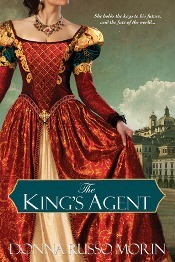 The glories of Renaissance Italy spring to life in Donna Russo Morin's latest novel, a historical quest-adventure that combines romantic tension, literary lore, and suspenseful whimsy.
The glories of Renaissance Italy spring to life in Donna Russo Morin's latest novel, a historical quest-adventure that combines romantic tension, literary lore, and suspenseful whimsy.The King's Agent offers something more unusual than the feminine cover implies. Its male and female leads share the spotlight, and the fantastic plot twists wouldn't be out of place in a Da Vinci Code-style thriller.
Battista della Palla (a historical figure), is the art agent to François I of France, which means he steals treasures from Italian palazzos to add to the royal collection. Though a Florentine through and through, Battista is loyal to King François and hopes his support will help free his beloved city from Medici tyranny. In the early 16th century, France and Spain are at war, so the king presents Battista with a new assignment: Find an ancient Greek sculpture which may hold the key to France's victory.
Battista is aided by Lady Aurelia, ward of the Marquess of Mantua, a sheltered noblewoman with a mysterious secret who saves his life during one of his escapades of thievery. All her life, decisions have been made for her, so Aurelia jumps at the chance to join Battista and his coven - and her thorough knowledge of Dante's Commedia tips the balance in her favor.
They are left a triptych of clues that represent the epic poem's tripartite structure, and their quest is as much literal as allegorical, with booby traps, phantom fire, mysterious rivers of blood, and much more awaiting their clever band. Aurelia leads the way, but whether their journey will lead to glory or to sin is unclear.
Morin's lush descriptions of clothing and geography are superb, illustrating both era and place in bountiful, vibrant detail. I could easily picture each person's outfit - including Aurelia's hair accessories of choice - and how the items were tailored to each aspect of their adventure.
There are many creative images, some clever (Aurelia is not a young woman but a "solitary, well-simmered beauty") and some overdone (doors "gilded with gold"). The novel's first third has a high concentration of alliterative phrases: "The sound of splitting skin and splashing liquid pop, pop, popped behind them, and within seconds a screeching of horses followed," to give just one example. I confess I was so busy picking out these playful patterns in the prose that I lost the tale's thread. When Battista and Aurelia's stories unite at last, the plot loses most of the linguistic embellishments and finds greater clarity and purpose, culminating in a surprising finish.
The novel certainly did expand my vocabulary, particularly in Italian, and the author's obvious love for Italian history, art, and culture permeates the text. A few other Renaissance notables make appearances, and even with Battista's and Aurelia's strong personalities, the divine Michelangelo steals every scene he's in - as he should. Overall, a rollicking and enlightening read, and a good deal of fun.
The King's Agent was published by Kensington in March at $15.00 / Can $16.95 (trade pb, 411pp, including historical notes and discussion guide). Visit additional stops on Donna Russo Morin's virtual book tour.

Published on April 24, 2012 05:00
April 19, 2012
Long-awaited contest winners
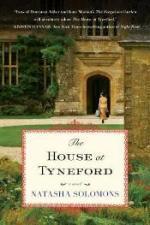 At the beginning of April I offered a giveaway for two copies of Natasha Solomons' The House at Tyneford. The deadline was Sunday night, I drew the winners on Monday, yet I neglected to post the details until now. My apologies.
At the beginning of April I offered a giveaway for two copies of Natasha Solomons' The House at Tyneford. The deadline was Sunday night, I drew the winners on Monday, yet I neglected to post the details until now. My apologies.After I removed all of the duplicate entries (quite a few! I think people assumed there were technical problems when there weren't) I went over to Random.org and drew the names of Wendy Koehler and Sandra K321. Wendy and Sandra, hope you enjoy the book! Congratulations - I'll be in touch via email.
Thanks to all who entered. As a sidenote, I'll be sticking to Google Docs for any upcoming giveaways I do. Seems easier for everyone, and it means you don't have to post your email address on a public site.
It looks like I'll be buried in review books for the immediate future... I just got three assignments for a May 10th due date (halfway through Enid Shomer's The Twelve Rooms of the Nile at the moment), and I turned another review in today for Victoria Hislop's The Thread. Fortunately, these are books I'd wanted to read anyway. All are lengthy novels, but at just over 400pp apiece, none qualifies for the chunkster challenge unless I count authors' notes and glossaries... and I think that's probably cheating.
Published on April 19, 2012 19:17
April 15, 2012
Book review: The Book of Madness and Cures, by Regina O'Melveny
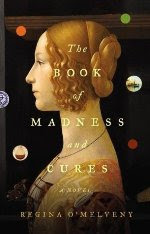 In O’Melveny’s creative, accomplished debut, a female doctor’s travels throughout Renaissance Europe create a striking historical tableau, but the personal connections she makes en route provide the novel’s emotional drive.
In O’Melveny’s creative, accomplished debut, a female doctor’s travels throughout Renaissance Europe create a striking historical tableau, but the personal connections she makes en route provide the novel’s emotional drive.In 1590, Gabriella Mondini loses her physicians’ guild membership due to her mentor-father’s longtime absence and leaves Venice to find him. His past letters provide clues to his location and mental state, which appears to be deteriorating.
With her devoted servants, she treks through Germany, Holland, Scotland, and France, sharing medical lore with other scholars, suffering occasional losses, and learning more about herself. The treatment of women varies from place to place: a red-haired Scottish doctor becomes a kindred spirit and more, while one German city remains eerily absent of females following a massive witch-hunt.
During the journey’s initial stopping points, Gabriella comes across as rather stiff; midway through, however, a surprising revelation shakes up her reserve and kicks the narrative into high gear. O’Melveny draws her scenes with vivid immediacy, opening readers’ eyes to the mysteries and wonders surrounding them during this transformative era.
The Book of Madness and Cures was published by Little Brown on April 10th at $25.99 (hardcover, 336pp). John Murray published it in the UK at £17.99. This review originally appeared in Booklist's February 15th issue. I'd agreed to take it on for my blog before the magazine assignment came through, so here it is!
Opinions on this novel are all over the place. See Amazon UK - there are far more reviews there than on Amazon US - and on Goodreads. It took a while to grow on me, so I understand where everyone is coming from. If you've read it, please leave a comment!
Published on April 15, 2012 09:02
April 12, 2012
Book review: A Parachute in the Lime Tree, by Annemarie Neary
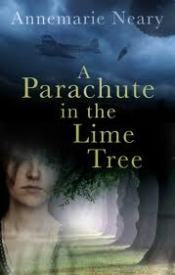 Annemarie Neary's literary novel takes a pensive look at four young people's intertwined experiences in Ireland during the Emergency - the time during World War II when its government showed its independence by taking an official stance of neutrality.
Annemarie Neary's literary novel takes a pensive look at four young people's intertwined experiences in Ireland during the Emergency - the time during World War II when its government showed its independence by taking an official stance of neutrality. The emphasis is on day-to-day life rather than political concerns, but readers will get a good sense of how the Irish reacted to the unease of their surroundings. The atmosphere, tense and lean, feels hauntingly real, and undercurrents of deep emotion run beneath the surface.
The most poignant stories belong to outsiders. Oskar, a Luftwaffe airman whose job it was to light the way for the bombers, takes a dangerous leap from his plane and parachutes into a tree in the Hennessys' garden in rural Dunkerin in southern Ireland. He hopes somehow to find the Jewish girl he once loved, his former next-door neighbor, Elsa, who had been brought over to Ireland via the Kindertransport. At seventeen, she was just barely eligible.
Elsa ends up first in Belfast and then in Dublin, where a friendly Jewish family takes her in. They all try to lie low, but her piano-playing talent attracts the attention of Charlie, a medical student. Elsa's story is the most deeply felt of all. Nobody ever gets trained in how a refugee should act, and with her parents' fate unknown in Amsterdam, she forgets sometimes to be grateful for her rescue.
Back in Dunkerin, Kitty Hennessy discovers Oskar's presence around her house and yard and decides to hide him. She seems superficial, at first. Kitty doesn't think of him as the enemy; rather, she sees him as her ticket away from her boring, sheltered existence.
The plot carefully winds through all of their experiences, past and present, as Kitty pursues Oskar, Oskar tries to trace Elsa, and Elsa and Charlie find their way to one another. Each sees the war from a different perspective, and none of them is neutral at all. There is a wonderful epilogue of sorts, set in 1999, which not only wraps up their tales but brings the entire novel into clearer focus.
With its thoughtful language and skillfully developed characterizations, A Parachute in the Lime Tree gets The History Press Ireland's fiction list off to a promising start. It was published in March at £12.99 or €13.50 (trade paperback, 239pp). Find it on Goodreads here.
Published on April 12, 2012 19:00
April 10, 2012
My 6th blogiversary - contest winners
A big thanks to everyone who entered my 6th anniversary contest. The best part was reading through all of your comments, which I really appreciate, and I got some good suggestions for things to include in future posts. As an example, adding a link to the Goodreads page for the books I write about is a fabulous idea I'll have to incorporate. I'm on Goodreads if anyone wants to find me there, too.

And now for the giveaway drawing, aka fun with sorting my giant spreadsheet. I can't imagine having to figure this out without Google Docs. I drew the winning entries with the help of Random.org.
Belinda Alexandra's Tuscan Rose is going to Allison G.
Barbara Erskine's Time's Legacy will be heading out to MaryKate
Barbara and Stephanie Keating's To My Daughter in France will be on its way to Janet D.
Roberta Rich's The Midwife of Venice was won by Jessica F.
Richard B. Wright's Mr. Shakespeare's Bastard will be going out to Noreen T.
and Margaret Wurtele's The Golden Hour belongs to Marianne C.
Congratulations to all the winners! I'll be sending emails out momentarily. Thanks again to everyone who entered... we'll have to do this again sometime.

And now for the giveaway drawing, aka fun with sorting my giant spreadsheet. I can't imagine having to figure this out without Google Docs. I drew the winning entries with the help of Random.org.
Belinda Alexandra's Tuscan Rose is going to Allison G.
Barbara Erskine's Time's Legacy will be heading out to MaryKate
Barbara and Stephanie Keating's To My Daughter in France will be on its way to Janet D.
Roberta Rich's The Midwife of Venice was won by Jessica F.
Richard B. Wright's Mr. Shakespeare's Bastard will be going out to Noreen T.
and Margaret Wurtele's The Golden Hour belongs to Marianne C.
Congratulations to all the winners! I'll be sending emails out momentarily. Thanks again to everyone who entered... we'll have to do this again sometime.
Published on April 10, 2012 18:46
April 8, 2012
The Historical Novel Society's brand new site
 One of the projects I've been helping out with for the last six months and more has finally been unveiled. The Historical Novel Society's new, improved website went online Saturday morning.
One of the projects I've been helping out with for the last six months and more has finally been unveiled. The Historical Novel Society's new, improved website went online Saturday morning.Under the guidance of founder/publisher Richard Lee, a small group of us have been working out the organization with our web designer, moving much of the existing content over, and inputting and categorizing a large number of reviews from the print Historical Novels Review magazine.
At present, over 2400 reviews are online. You can search or browse them by various criteria - author, title, subgenre, historical period, century, publisher, reviewer name, and more. The newest material went online first, and we plan include the rest as well - since 1997, the HNS has published over 12,000 reviews of historical novels and selected historical nonfiction. It's a big project!
Many of the feature articles and profiles from back issues of HNR and Solander are also online, in addition to original content commissioned for the website. The HNS's list of forthcoming historical novels is online too. Coming soon is a special members-only section, with additional content, discount codes, and a place for members to post their website URLs, blog details, and more.
Pop on over, browse through the reviews and other content - comments welcome. Hope you enjoy it!
Published on April 08, 2012 19:07



